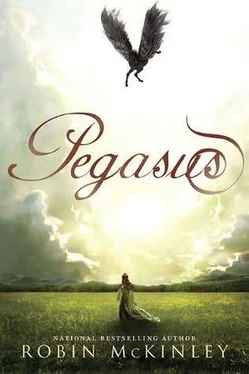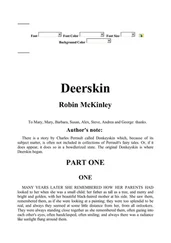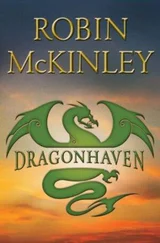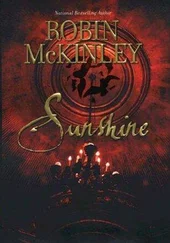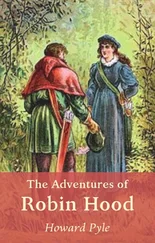After that their invitations came even more often. The most pressing, Sylvi noticed, seemed to be from towns where the mayors and sheriffs and head councillors—and fête organisers—had children or grandchildren old enough to sit up but too young to kick very hard.
But then something else happened. The older children—and far too many adults, who should have been old enough to know better—began to ask her to ask Ebon questions. Maybe it was the petting and the pony rides. The first time it happened Sylvi was so nonplussed she simply did—the question was so harmless (“What is your favourite colour?”), and the young woman who asked it was obviously trying to make some kind of friendly contact with the pegasus who had been kind to her children—twins, about a year old, and they’d each had a pony ride. And the woman looked so tired—too tired to remember explicit royal prohibitions—and so grateful. And perhaps Ebon’s answer (“The colour of the sky at dawn over the mountain called Cuandoia when we’re in the lower meadows. It’s best in autumn when we’re harvesting the llyri grass for the winter”) sounded a little too mystical, “mystical” not being a word anyone who knew him would apply to Ebon. But the king’s ban against questions, Sylvi and her attendants bemusedly realised, had been translated into “no political questions”: no questions about kings and treaties and government. And magicians. But the people had decided that Ebon was some kind of oracle.
The king, when this was reported to him, himself looked nonplussed and bemused, and then started to laugh. “Why should I have thought it was a simple, straightforward proscription? No questions. How can that be misinterpreted? Very well. I am willing to leave this to your judgement, Sylvi. Keep Ahathin close to you; he’ll intercede if you need him to—if you’re the least bit uncertain, let him do so. And come tell me about it afterwards.”
“And—Sylvi—try to remember not to wander around with your fingers curled in Ebon’s mane, will you? I realise that the—er—pony rides have confused the issue, but I did say something about behaving no differently than any other bound pair. The tradition of no physical contact is as old as the Alliance, and the casualness of your behaviour is disrespectful.”
If he were really cross he would call her Sylviianel, but he was right and she knew it. It was mostly comfort, having her hand in Ebon’s mane, especially on fête days when everyone was looking at them—and it was so easy to put it back there after she’d lifted a little rider down. But there was showing off in it too. “Yes, my sir,” she said.
“Good,” he said.
The pegasi weren’t that uncommon, even outside the palace—even outside the Wall. It was true that they mostly stayed in their own lands, but—Sylvi knew this from her father, but Ebon had told her the same thing—they felt humans needed to see them, and so they made a point of flying over all parts of the country, even the ones farthest from either the palace or their own territory, and stopping to graze and drink at meadows and streams near towns and villages. They never quite grasped human land ownership, and on at least one memorable occasion during Corone IV’s mother’s reign, a small group of pegasi had settled down for a mouthful and a nap on a piece of ground so hotly disputed that no human had set foot on it for a decade. But they knew to stay out of standing crops, because they raised crops themselves.
Any fête or festival big or important enough to host a member of the royal or any baronial family would expect the bound pegasus to attend also; as the presence of the pegasi at the palace was known to promote the welfare of the country, the presence of a pegasus or two at a fête was believed to contribute to the success of the occasion, especially if it were an occasion like a spring or a harvest festival. And there were the open court days at the palace, and occasional parades, all of which would feature pegasi. But ordinary people seemed as stirred at the idea of being able really to talk to a pegasus as Sylvi herself was—which she could understand. Perhaps it was this that had transformed itself into a hope that the pegasi could answer private questions the interlocutors couldn’t answer themselves merely because such questions weren’t about kings and treaties and governments.
Some of the questions weren’t difficult. The little girl with the grey-and-black zurcat in her arms wants to know if it will have any spotted kittens. Spotted zurcats always had spotted kittens. If it’s pregnant it will, replied Ebon with perfect logic.
Sometimes she was surprised at the things the pegasi knew, and wondered why humans hadn’t worked harder to learn some of them. Ebon was very good on weather, for example, and certain aspects of farming. No, he doesn’t want to put veer in this year, it’s going to be a hard winter, it’ll be too cold to grow. Djee would be better—you humans use djee, don’t you?—it thinks a good snow layer is warm and comfy. Maybe the Speakers’ Guild wasn’t very interested in farming.
She’d learnt early on not to ask him the truly oracular ones. The big good-looking girl wearing the red scarf wants to know whether she should marry the blacksmith or the baker.
Tell her she should run away to sea and become a pirate.
The tall man with the scar on his cheek wants to know if the gods live on the moon.
I’ll look around the next time I’m there.
He’ll think you can fly to the moon!
He already thinks we can.
Which was probably true. But what did you do with questions like that? She’d come storming—or rather, she’d walked perfectly calmly, but inside she was storming—from a council meeting where Senator Barnum had wished to discuss her comportment —hers and Ebon’s—at their public appearances, and how they needed to appear sensible and mature. “Mature!” she’d burst out later to Ebon. Mature! And Dad and Ahathin just say that that fat tick Barnum is a citizen too and he’s not the only—the only pompous pudding-head we need to remember will be doing his best to find fault!
Ebon had unfolded and refolded a wing— whoosh snap —and shook his head violently two or three times, which was the nearest a pegasus ever came to angry: Yes. I’ve already had the pitch from Dad, and Gaaloo. I promise not to trample any small children or to sneeze in anyone’s food. If they think we’re so dangerous to concord and prosperity, why do they want us to go?
After a little silence Sylvi said, You know why. Ebon made a half whuffle, half hum, that she knew from the rituals; it meant “our fate is our fate.” But he added, That’s always been a dumb line. It just means shut up and don’t make trouble. Sometimes you have to make trouble. He paused. But this isn’t one of those times. Okay. He sighed a vast gusty sigh—the vast gusty sigh that only a pegasus can sigh—and Sylvi rubbed his mane. And he tried to repress himself—not always successfully—and Sylvi tried to be careful what she repeated back to their human audience.
They saw magicians in the crowds sometimes—never among the people immediately around them wanting answers to their questions—but rather more often at the outskirts of those people than seemed to Sylvi at all reasonable. These were not the village witches, the little wizards, whom they often saw, and who could be expected to come to their local fêtes, but the big magicians, the members of the guilds, who didn’t come to little country fêtes. Except that they did. Sylvi tried to tell herself that before Ebon she hadn’t gone to many country fêtes herself, and maybe guild magicians came to more of them than she realised. But she didn’t believe it.
Читать дальше
